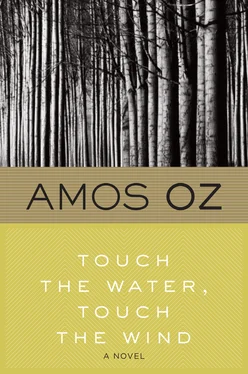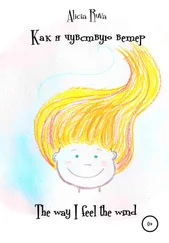Amos Oz - Touch the Water, Touch the Wind
Здесь есть возможность читать онлайн «Amos Oz - Touch the Water, Touch the Wind» весь текст электронной книги совершенно бесплатно (целиком полную версию без сокращений). В некоторых случаях можно слушать аудио, скачать через торрент в формате fb2 и присутствует краткое содержание. Год выпуска: 1991, Издательство: Mariner Books, Жанр: Современная проза, на английском языке. Описание произведения, (предисловие) а так же отзывы посетителей доступны на портале библиотеки ЛибКат.
- Название:Touch the Water, Touch the Wind
- Автор:
- Издательство:Mariner Books
- Жанр:
- Год:1991
- ISBN:нет данных
- Рейтинг книги:5 / 5. Голосов: 1
-
Избранное:Добавить в избранное
- Отзывы:
-
Ваша оценка:
- 100
- 1
- 2
- 3
- 4
- 5
Touch the Water, Touch the Wind: краткое содержание, описание и аннотация
Предлагаем к чтению аннотацию, описание, краткое содержание или предисловие (зависит от того, что написал сам автор книги «Touch the Water, Touch the Wind»). Если вы не нашли необходимую информацию о книге — напишите в комментариях, мы постараемся отыскать её.
1939. As the Nazis advance into Poland, a Jewish mathematician and watchmaker named Pomeranz escapes into the wintry forest, leaving behind his beautiful, intelligent wife, Stefa. After the war, having evaded the concentration camps, they begin to build new lives, Stefa in Stalin’s Russia and Pomeranz in Israel, where, as they move toward reunion, another war is brewing. An intricate tale of people seeking escape from a hostile world in thrillingly fantastical ways.
Touch the Water, Touch the Wind — читать онлайн бесплатно полную книгу (весь текст) целиком
Ниже представлен текст книги, разбитый по страницам. Система сохранения места последней прочитанной страницы, позволяет с удобством читать онлайн бесплатно книгу «Touch the Water, Touch the Wind», без необходимости каждый раз заново искать на чём Вы остановились. Поставьте закладку, и сможете в любой момент перейти на страницу, на которой закончили чтение.
Интервал:
Закладка:
Twenty-five paces from the door of the house all the men halted. Brimming with tact, their tense stance displaying their deep consideration and respect, they left Stefa to cover the final stage of her journey alone and undistracted. How pale she looked. Even her lips were white. She went inside and the door closed behind her.
The fair-haired young men would remain for a while; they had orders to survey the locality, or perhaps to count the mountains and hills and compile an index of valleys until the receipt of further instructions. As for their master, he weighed anchor and was away, a little man with monstrous ears in a big wide car. He hummed some Jewish ya-ba-bam to himself, thumped the steering-wheel a couple of times, and pondered for a while a serious tactical error of Rabbi Jacob Emden, and Rabbi Jonathan Eibeschutz's failure, to his dying day, to exploit his opponent's blunder. For once the little man did not say much, even to himself. All he said was: Nature reigns supreme on mountain, vale, and stream. Gematcht. Geendikt.
44
Powerful pent-up forces were accumulating hour by hour. War was brewing. A tense heat filled the air. A panting. A strange stillness. The sun-scorched corrugated-iron roofs radiated a white-hot hatred. A belated spring blazed over the hills and plains. Not a bird was to be seen. The unharvested corn rustled drily as if sensing smoke. No dark forests here, Stefa, to flee to. Only white light. No abandoned huts to hide in, no last-minute chance to found a Goethe Society. Everything is enclosed. Everything is open and dazzling. Another war, but no water, no darkness. Run-Jesus. Its just as the Ruthenian doctor foretold, and his one-armed organist friend. They foresaw it all.
The harvest was halted. Even the weeding of the cotton fields ceased, because all the young reservists had to rejoin their units. The older women cleaned out the air-raid shelters and picked flowers for wreaths for Ernst's funeral, which was to take place the next day. Elderly members, some of them shrivel-skulled like the ancient revolutionaries who ravished Stefa in Krasnoyarsk, others heavy-jawed and stubborn, their gnarled features expressing an almost prophetic rage, were summoned for emergency tasks. They pushed loaded handcarts from place to place, sorted cans of food, distributed candles and paraffin lamps, made up packages of cookies, filled water containers.
Even Ernst's two mistresses, despite their bereavement, were put to work crisscrossing windows with strips of gummed paper. Young Yotam, confused and frantic, volunteered to help dig pits and trenches. He was in a turmoil of indecision, because he could not come to terms with war, with the digging, with his father's death, with beef-canning; his whole life suddenly struck him as hopelessly confused and contradictory. Furthermore, the spadework was too much for him. His hands developed painful blisters, and when the blisters burst, and the salt sweat trickled into the open sores, and the dust, and the filth, the pain was severe and Yotam bit his lip and fought back a tear. On the other hand, he was happy and proud to show his father how he could bear hardship and how far he had dug. His father laughed soundlessly and his teeth showed big and white and amazingly strong. The son redoubled his efforts, began to dig hysterically, scattered soil in all directions, attacked the hard earth with his spade in a blind rage, with rapid ineffectual strokes, flailing like a drowning man. Before long he had hit his own foot, bled a little, and calmed down. His wound was dressed, and he was sent to sit down in the shade of the trees. There he encountered Audrey, who was preparing first-aid kits and rolling bandages. He introduced himself, spoke, received an answer. Audrey changed his dressing and agreed with everything he said. The hours flew by, she was ready to dry his sweat with her hair; and he took her by the shoulders and raised her to her feet.
Since Yehuda Yatom's son Shaulik had been mobilized to command his tank unit, it was necessary to put Pomeranz in sole charge of the sheep. There was a knock on his door at six o'clock in the evening. His guest accompanied him to the sheep pens and it was after dark when they made their way back to the dining hall.
Supper was eaten by the light of paraffin lamps, because the electricity supply was cut off. Those of the older members who were not away in the army or on special guard duty on the perimeter, together with the women and children, discussed over their meal the developments that might be expected. There were some who held that the moment of crisis had already been reached and that from now on there would be a gradual relaxation of tension. Some refused to believe that the outside world would stand aloof from the course of events. Others analyzed the news and interpreted the signs. And still others maintained that the worst was still to come.
Many of those who were silent were not listening to the discussions but were thinking of Ernst lying all alone in a black-draped coffin set on four chairs on the large veranda of the recreation hall. Thanks to the power cut the coffin now lay in total darkness. And the easterly breeze brought the sounds and smells of the night to ruffle the shroud and perhaps even remove it to examine the wood and the slight gaps between the boards. These forces, everyone knew, were not friendly; they were not on our side.
There were a few who openly pronounced Ernst's name, and wondered what he would have said this evening, in the light of the new situation. It was not easy to get used to Ernst's death. There were even some who could not touch their food. They simply drank tea.
After the meal they all returned to the various tasks they had undertaken. Pomeranz and his guest were requested to work through the night in the stores. There was not a soul, elderly invalids and nursing mothers included, who did not volunteer for special duties. And when there were no more jobs left to be done and the night was so deep that even the silhouettes of the mountains to the east were swallowed up in the darkness, they all began frantically cleaning. There were no further preparations to be made, so they scrubbed the floor of the clinic, they sprinkled the basins in the shelters with powerful disinfectants, they brushed the mosquito screens in the dining-hall windows, they sprayed concentrated insecticides in the outhouses, and they swept the concrete paths.
Out of the dark night came the sound of engines and the usual prattle of frogs and chorus of crickets. The sound of the crickets seemed much more distinct, much louder and more penetrating than on previous nights.
In the course of the night efforts were made in various quarters to allay the threat of war. Heads of state passed urgent messages. Various sources spread rumors to prevent desperate reactions. There were threats, there were insistent pleas. Emanuel Zaicek appeared simultaneously in many different places; knowing no rest, clad in the bear's skin, with his staff in his hand and his knapsack on his back he crossed lands and seas and wherever he came he preached to the people. There were no young men among his hearers: some had been called to arms, others were drinking in taverns or sleeping in their beds. Women, old folk, and little children eyed him with deep suspicion, half-hearing his voice gently caressing its every word; some cast stones, other kindlier souls offered him alms and broth. The philosopher Sartre and his circle drew up and circulated a carefully worded Open Letter addressed to the Arabs and other men of good will, imploring them to show restraint. And the secretive little man who had just brought Stefa home to her own land hurried on to his new task without even pausing to visit his shabby bachelor rooms on the outskirts of Old Bat-Yam. Quick as lightning as dusk fell he took off in a military aircraft for Malta. There he sat in a hotel bar and talked till the early hours with three American representatives in civilian clothes. The Americans were very discreet, pleasant looking and well spoken, with fine manners and a precise sense of humor. The little man, for his part, treated them to an exaggerated display of politeness, and addressed them in a patient Talmudic singsong which after an hour or two had the effect of slightly numbing their senses. He larded his speech with proverbs and pointed syllogisms, leavened it with rhymes and sayings, skipped from subject to subject, made jokes at his own expense, painted elaborate word-pictures, then suddenly declared that enough was enough — we may not see the wood for trees, but there's no smoke without a breeze, as any man of sense agrees.
Читать дальшеИнтервал:
Закладка:
Похожие книги на «Touch the Water, Touch the Wind»
Представляем Вашему вниманию похожие книги на «Touch the Water, Touch the Wind» списком для выбора. Мы отобрали схожую по названию и смыслу литературу в надежде предоставить читателям больше вариантов отыскать новые, интересные, ещё непрочитанные произведения.
Обсуждение, отзывы о книге «Touch the Water, Touch the Wind» и просто собственные мнения читателей. Оставьте ваши комментарии, напишите, что Вы думаете о произведении, его смысле или главных героях. Укажите что конкретно понравилось, а что нет, и почему Вы так считаете.

![Хироми Каваками - Strange Weather in Tokyo [= The Briefcase]](/books/29150/hiromi-kavakami-strange-weather-in-tokyo-the-br-thumb.webp)










